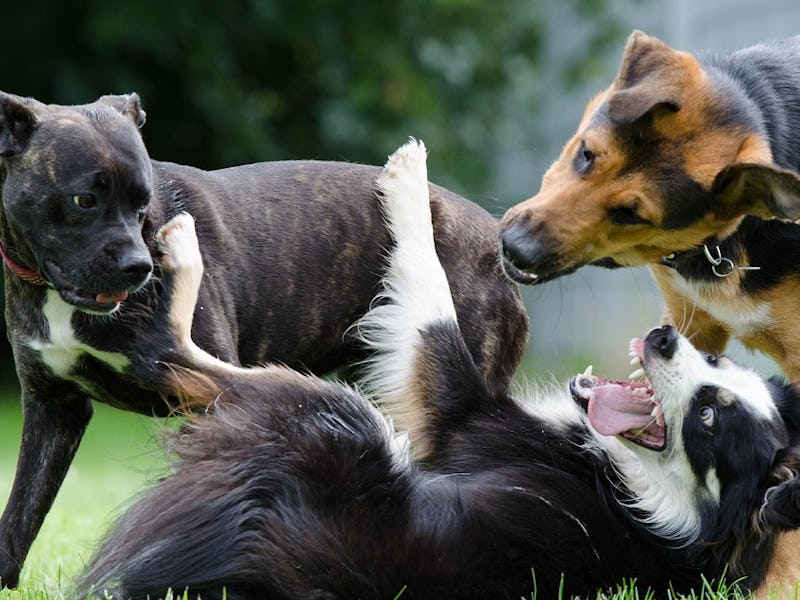Humans Are to Blame for Making Dogs So Bad at Handling Conflict
There's an evolutionary reason your pup doesn't play well with others.

Go to a dog park, and you’ll see how much humans have messed up canine society. There, you’ll see dogs chasing each other in circles, fighting, and sitting on their owner’s laps, refusing to interact with other dogs. Domestication, a new study in the July edition of Royal Society Open Science demonstrates, has made dogs not so great at hanging out with each other. In fact, it’s even made them ridiculously petty.
As the study suggests, dogs, if they could speak in human tongue, would give very bad conflict management advice: After they fight, they just avoid each other. Wolves, in comparison, frequently reconcile after a conflict, sometimes patching things up a minute after the fight has ended.
This process of reconciliation, the study authors explain, is an important strategy for maintaining functional relationships and pack cohesiveness. But because domestication has made it less necessary for dogs to rely on one another, they have a diminished need to cooperate. While wolves practice group hunting, cooperative territorial defense, and raise each other’s young — regardless of parentage — packs of dogs are mainly scavengers and known for a “flexible and more promiscuous mating system.” Dogs, the researchers note, are more interested in forming a relationship if the promise of food is involved.
Wolves are more likely to experience conflict, but they're also more likely to reconcile afterward.
In this particular study, conducted at the Wolf Science Center at the University of Veterinary Medicine in Vienna, the scientists observed four captive wolf packs and four captive dog packs that lived in identical large enclosures. All of the wolves were born in captivity, and the dogs were adopted as puppies from a shelter. Each was introduced to its individual pack after turning five months old.
From January 2013 to March 2015, the researchers observed the packs and recorded all growling, aggressive encounters. They found that the wolf packs engaged in 419 aggressive interactions, while the dog packs only engaged in 55 aggressive interactions. But, despite the wolves having more conflicts, the dog fights were much more intense: 86 percent of dog conflicts counted as “high-intensity aggressions,” while only 59 percent of wolf conflicts were classified as the same. Some dog fights got so intense that a few individuals had to be taken from their packs because the fights became too intense. All of the wolves, however, kept things civil.
Furthermore, 42 percent of the wolves reconciled with their aggressors almost immediately after conflict. Meanwhile, in the packs of dogs, the authors found no evidence of reconciliation after aggressive encounters. This differs from the findings of some previous studies showing that dogs can reconcile, but the authors of the new paper note that the big difference between this experiment and others is that none of the dogs were related to one another.
Dogs were more likely to have intense conflicts.
“The difference in the social ecology of dogs compared with wolves may explain the difference in their tendency to reconcile,” they write. “This reduced dependence on pack members may have relaxed the selection for communicative complexity, resulting in less frequent communicative threats, more intense physical aggression when conflicts occur, and avoidance strategies remaining as the main alternative.”
The team’s findings are in line with previous studies that a “domestication effect” has caused dogs to rely on each other less than wolves rely on other wolves. In a 2017 paper published in PNAS, scientists showed that wolves are much better at cooperating with each other than dogs are, as demonstrated by a string-pulling task.
As the video above shows, the wolves almost immediately coordinated their actions in order to successfully pull the rope ends, leading to success. The dogs, meanwhile, very much did not. The scientists explain that while domestication promoted cooperative interactions between humans and dogs, it also resulted in a lessened ability to cooperate with their own species.
Scientists believe that dogs split from wolves 40,000 years ago as a result of a two-part domestication process. As ancient civilizations began to use dogs for hunting and companionship, both the dogs’ DNA and behavior changed. That’s good news for humans looking for a pal and bad news for dogs who run into problems with their pack.